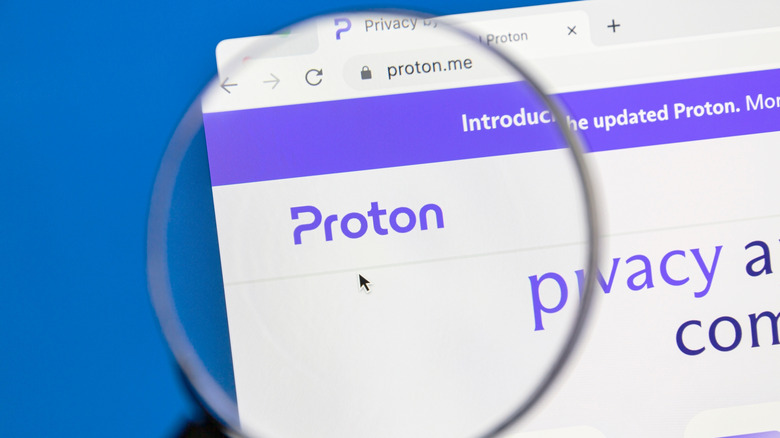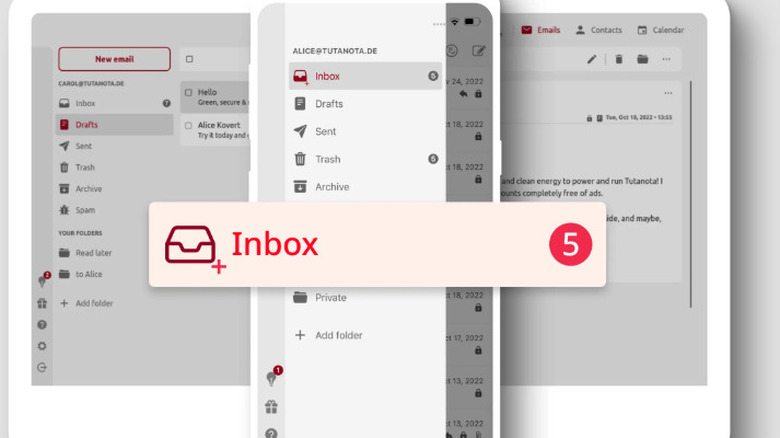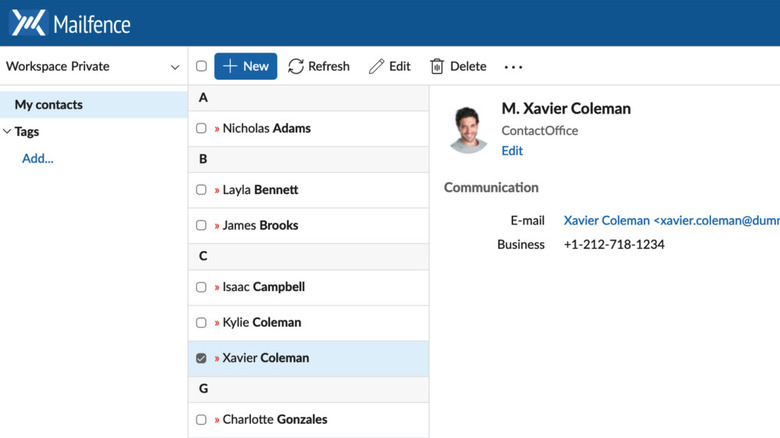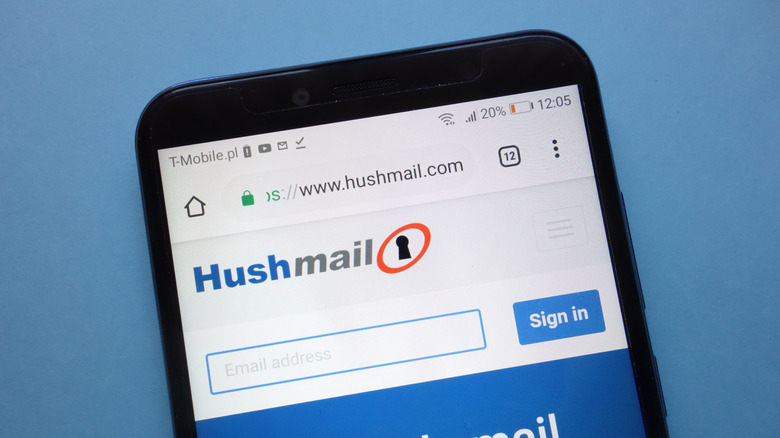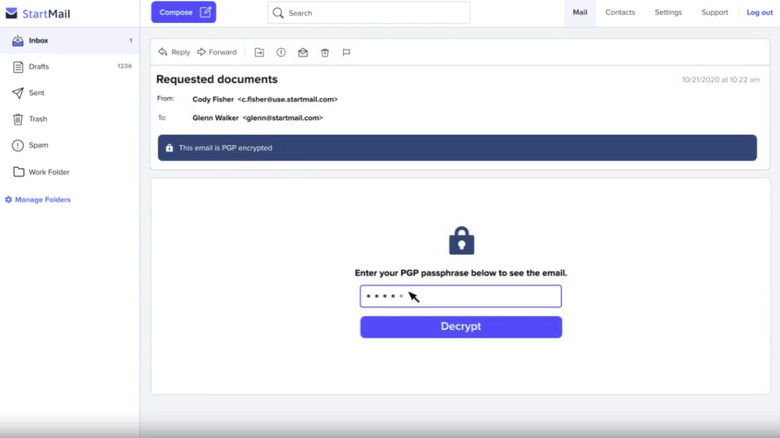5 Of The Best Alternatives To Proton Mail
If you've spent time in online privacy forums or security-focused communities, you've almost certainly heard of Protonmail. You may have even tried the service out yourself. With over 100 million accounts, it's arguably the most famous secure webmail service and, for a long time, has been viewed as one of the best alternatives to Gmail for those who want to have more control over how their data is handled.
Email providers like Gmail and Yahoo offer lots of great features for free. However, all those freebies come at a cost, as these popular email services track your activity and target you with ads. In contrast, Protonmail uses end-to-end encryption and doesn't collect any data linked to a user's identity, and the basic version is free. But if you like it, you'll want to upgrade to take advantage of all of the security protections it offers.
With so much going for it, it's easy to see why it has become the first choice of security-minded internet users. Still, most people like options, and while the pickings have traditionally been slim in the secure email space, things are changing with several secure email services coming into existence over the past decade or so. While Protonmail is still the most well-known secure email service, it's not the only game in town.
Tuta Mail
With servers based in Germany, Tuta (formerly Tutanota) is one of the best secure email providers and is worth a closer look if you're searching for a Protonmail alternative. You won't have to worry about Tuta harvesting your data to sell to advertisers; instead, its business model is based on donations and premium subscriptions. When users sign up for Tuta, they can choose from three different accounts.
The free account comes with one GB of storage and one calendar; the Revolutionary account comes with 20GB of storage, unlimited calendars, 15 extra email addresses, and three custom domains for €3/month or €36/year before taxes, while the Legend account comes with 500 GB of storage, unlimited calendars, 30 extra email addresses, and 10 custom domains for €9/month or €108/year.
Tuta comes with automatic end-to-end encryption with post-quantum safe cryptography, two-factor authentication, and zero-knowledge architecture, so your data is never stored in plain text on its servers. You get this protection for Tuta Mail and Calendar. As expected from a secure email service, there are no tracking or personalized ads, and they don't scan your emails. The company takes protecting your privacy a step further by blocking images by default. External content will only be loaded when you open an email if you allow it, giving you extra protection against tracking pixels and hidden scripts. The Tuta Mail app is available on iPhone and Android.
Mailfence
When you visit the Mailfence website, you're greeted with the statement: "Privacy is a right, not a feature" — a belief shared by most people looking for a secure email service. While it's not perfect, for the most part, the Belgium-based email provider lives up to this ideal. When you log onto Mailfence, you're using an email client that won't track you, has no backdoor, and promises to keep your email free from government surveillance. The service uses end-to-end encryption, and while it does store your privacy key on its servers since it's encrypted with your passphrase, nobody at the company can read it.
Mailfence's free plan comes with one GB of storage (500MB for emails, 500MB for documents), the base plan comes with 11GB of storage (5GB for emails, 6GB for documents) plus ten aliases for $2.50/month, and the Entry Plan comes with 40GB of storage (10GB for email, 30GB for documents) plus 50 aliases for $3.50/month. The Base and Entry plans are billed yearly. You can use Mailfence on iOS and Android.
Mailbox.org
If you're searching for a secure email service that looks a lot like Google Workspace or Microsoft 365, Mailbox.org might just be what you're looking for. Mailbox.org doesn't stop at secure email; it offers an entire suite of services, including online office, cloud storage, and video conferencing. Mailbox.org uses PGP encryption to secure your emails, calendar, and address book. There are no ads, no tracking, two-factor authentication, anonymous payment, and no unnecessary data collection. The service doesn't have a dedicated mobile app.
Unlike Tuta and MailFence, the Germany-based Mailbox.org doesn't offer a free plan. Instead, you'll have to pay at least €1/month for its least expensive service, which comes with 2GB of mail storage, three aliases (for team accounts), Calendar and contacts only, and limited support. Upgrade to the Standard plan for €3/month, and you get 10 GB of mail storage, 5GB of cloud storage, 25 aliases @mailbox.org, 50 aliases @customdomains, online office, secure video conferences, and regular support. The Premium account costs €9/month and includes 25 GB of mail storage, 50 GB of cloud storage, 25 aliases @mailbox.org, secure video conferences, priority support, and telephone support.
Hushmail
The Canada-based Hushmail has been around since 1999, making it the oldest secure email service on this list and among the oldest in the industry. When you sign up for the service, you get an inbox that's free from advertising, along with OpenPGP encryption to keep your correspondence private. Hushmail works a lot like standard email services, except you can encrypt your emails before you send them to protect your personal information. If you send an email to another Hushmail user, it's automatically encrypted.
When you send an email to someone not using Hushmail, they receive a link directing them to read your message on a secure webpage after they create a passphrase. There's no free Hushmaili option and there's no free trial for the personal account, so you can't test it out before paying. However, there is a 60-day money-back guarantee. The Hushmail Premium plan costs $59.99 per year or $139 every three years and comes with 15GB of storage. There is an iPhone app (with pretty mixed reviews) for Hushmail, but no Android app.
StartMail
When it comes to features, StartMail has just about everything a security-minded user would expect, including no ads, no tracking, and unlimited aliases. The company and its servers are based in the Netherlands, meaning they're protected by Dutch privacy laws and the EU's GDPR — some of the strictest privacy regulations in the world.
Emails you send through StartMail are secured with PGP encryption, and recipients can reply to your emails using a password you set for them. Unlike other free email services, StartMail won't create a profile on you, analyze your emails to send targeted ads or sell your personal information to advertisers. If you want, you can create a disposable email address for every service you sign up for to minimize spam and make it easier to trace the source of any data leaks.
The personal plan costs $4.99/month or $3/month if paid annually and comes with an email address with the StartMail domain or one custom domain, 20GB of storage, and you get a 25% discount off additional accounts. If you need more features, you can sign up for the business account for $6.99/month or $4.20/month if paid annually. The business account includes an email address with your custom domain, 30GB of storage, the ability to add unlimited domains, shared aliases with your custom domain in a group subscription, and 25% off additional accounts. Both the personal and business accounts come with a 7-day free trial, and you can pay for annual subscriptions with Bitcoin. Startmail doesn't have a mobile app.
